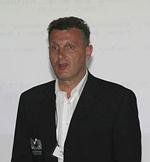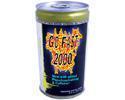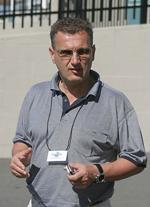
Recently on Cyclingnews.com |
An interview with Heiko Salzwedel, December 24, 2003
Salzwedel challenges "contradictory" WADA to re-think caffeine stance
The decision by the World Anti-Doping Agency (WADA) to remove caffeine and pseudoephedrine from its list of restricted substances astonished many coaches and sports administrators when it was announced in September. Cycling coach to the UK, Australia and Germany, Heiko Salzwedel, has questioned the wisdom of the latest changes to the list of banned subtances, supporting the comments of other sports scientists and coaches who also criticised WADA earlier this year. It would appear the reservations of these coaches has been picked up in Switzerland, with the International Cycling Union (UCI) yet to announce if cycling will adopt the 'WADA list' in 2004.
By Karen Forman
 |
The World Anti-Doping Agency has contradicted its own position on the use of supplements in sport in removing substances such as caffeine and pseudoephedrine from the list of banned drugs and should change its mind, especially when it came to the sport of cycling, international high performance coach Heiko Salzwedel said in Australia recently.
Salzwedel told attendees at a coaching clinic on the Gold Coast in a special session on supplement usage, that he was shocked at WADA's announcement six weeks ago, particularly given its previous comments relating to supplements.
(Come January 1, 2004 - when the "WADA List" effectively replaces what's called the "IOC List" - any athlete will be allowed to use unrestricted quantities of performance enhancing substances that are still either illegal or allowed in limited quantities.)
"WADA's position on supplements is basically crap," he said. "In 2000 it said that doping was 'everything which enhances performance' and recommended that athletes did not take nutritional supplements at all. But now it has recommended to legalise the use of substances which have been scientifically proven to enhance performance - I have examples from my time with the Australian Institute of Sport, as head cycling coach - which is against their own rules."
He said he wasn't sure how hard the UCI was fighting against the changes six weeks ago. "I know many other sports are much more hypocritical [about drugs] than cycling, because cycling is fairly proactive when compared to other sports. For example at this year's World's in Hamilton where a young female cyclist was not allowed to start the road race after she was tested to have a too-high haemocyte level. It doesn't mean she was positive but it was a clever idea of the UCI. She just wasn't healthy enough to perform."
But he suggested the UCI could perhaps take a stronger stand. Salzwedel said he was particularly concerned at the withdrawal of caffeine from the banned list. "Pseudoephedrine, well I think it makes sense as a lot of riders when they have colds cannot take anything to restore their health but what in the hell are they doing allowing caffeine?"
He recalled a 1997 survey on which the National Road Cycling Program worked with the AIS Physiology and Applied Nutrition department, where 19 pro teams had been asked what riders drank during racing.
"Eleven of the teams completed the survey and we learned that 90 per cent of riders drank Coca Cola. Only one team did not. At that point Dr David Martin asked, 'is this another example of athletes being ahead of scientists?'.
Potent combination
"I attended a conference in Canberra in 1998 when I was with the AIS where, amongst others, an Australian army scientist spoke about how long soldiers could go without sleeping. They tested separate groups on water, caffeine, pseudoephedrine and a combination of caffeine and pseudoephedrine. The water-only group lasted five days, the caffeine-only group seven days and the pseudoephedrine-only group lasted six days.
 |
"But the combination group with caffeine and pseudoephedrine lasted 12 days! I was shocked about the outcome; the efficiency of the combination of caffeine and pseudoephedrine. This is real stuff - and WADA allows it now! I can already see the parents mixing pots of it."
Salzwedel said he personally believed the UCI was doing a "wonderful job" which "could be better but they are certainly doing a lot better than a lot of other sports in weeding out doping" and that he agreed with WADA that there needed to be a focus on getting rid of the hard drugs.
He maintained, however, that removing caffeine from the banned list could spell disaster in many ways. "You could have some parents and coaches mixing it up for their kids and others not and the kids who are not getting it and [not] performing up there losing confidence in their coaches," he said. "Plus there are the health issues. I am a coffee addict myself and once I stopped it for one month and I am never a person who gets headaches and illness, but I had bad headaches and withdrawal symptoms."
The question is, what differentiates between supplements and doping? When does a supplement become a performance-enhancing drug that should be banned? Should supplements be allowed at all? "We live in a time where success is appreciated; we are a performance-based society and we love winners," he said. "The pressure is and will continue to be higher and higher for our athletes to perform at the top level and supplements are the answer. The question is, should we ban them, or manage them?"
Supplements booming
Salzwedel said in the past, more athletes had become innocent victims of some supplements which had been contaminated with forbidden drugs. "There have been more positive drug tests in the past four years (but) it has always been difficult to distinguish between innocents and cheats," he said. "The supplements industry is booming, with billions of dollars, particularly in the United States, spent each year."
Salzwedel quoted UCI president Hein Verbruggen, who said he was convinced that there was a small group of hardened cheats, a large group who felt it was okay to take things but not in excess, a group that takes legal drugs and a group that takes nothing.
"The question is, where do supplements stop and doping start?" Salzwedel said. Salzwedel explained that in 1998 in an interview published in the newspaper El Mundo, former IOC (International Olympics Committee) president Antonia Samaranch said that, "doping is those substances prohibited by the medical commission of the IOC" and "drug taking is anything which firstly damages the health of the sportsperson and secondly artificially improves performance. If something produces just the second effect, then it's not drug taking. If it produces the first, then yes."
The world's governing body on drugs in sport, WADA, in 2002 suggested that doping was "everything which enhances performance" and added "substances/methods are prohibited because of their potential to enhance performance and risk harm to athletes and are contrary to the spirit of the sport" according to Salzwedel.
But it appears, according to data collated by Salzwedel for a presentation at the National Coaching Conference in the United Kingdom in November 2002 that the position on supplements differs somewhat around the world.
"WADA's position on supplements was that athletes can and should meet their nutritional needs through a healthy balanced diet;" said Salzwedel, "that there was no evidence that demonstrates significant benefits of supplements to elite athletes; that inadequate labeling and insufficient quality control existed; that the intake of supplements could lead to a doping offence; and that a poorly-labeled supplement should not be regarded as a defence in a doping hearing.
"Therefore WADA recommends that athletes do not take nutritional supplements at all. But my opinion is that if you want to win the Tour de France, well, I don't believe any winner in the past 100 years has won with purely water. WADA might be right with some sports but cycling is different."
No supplements policy in UK
 |
The position of UK Sport, according to Salzwedel who worked with the organisation before joining British Cycling, is that, ideally, supplements should not be taken at all. "They say that there is a lack of scientific studies and reliable evidence, that many supplements are not licensed, that manufacturers vary contents without warning, that some unlicensed products contain prohibited substances and that if necessary supplements should be taken with caution and at the athlete's own risk," he said.
The AIS, meanwhile, launched a proactive sports supplement program in 2000 aimed at ensuring Australia's elite athletes made good use of dietary supplements. "The program includes yearly evaluation and fine-tuning to ensure it continues to be at the cutting edge," Salzwedel said. "It says supplements can play a small but substantial role to achieve peak performance, however it recognises that there is a lot of marketing hype."
British Cycling - whose approach Salzwedel believes is right - suggests that in theory, all nutrients that are needed for normal function can be provided from the diet, but given the extreme physical demands of cycling, it may sometimes be difficult to ensure adequate nutrition in the diet alone.
"BC says athletes should have a sound performance diet supported by the correct use of supplements," he said. "And that it supports athletes with safe ethical products and a structured education plan.
"BC formed a nutritional steering group which requires riders to check with the team doctor before taking any supplements, with annual supplements review of all riders. As well, BC is working with GlaxoSmithKline, which makes [sports drink] Lucozade, to develop cycling-specific products. Riders have been involved in the process and the result is a product that is very pure."
Salzwedel, who said that it was acceptable now to admit that there had been "a drug culture" in "the old days - especially in the Six-Days which was a joke," said he was glad of the crackdowns. "I know cyclists who are having health problems now from drug use back then," he said. "I am happy that this cleaning process goes ahead."
Related stories
WADA makes "mistake" with new approach
to doping (September 25, 2003)
Salzwedel
back on familiar ground (May 2002)
Heiko Salzwedel - British
Cycling's new track coach (April 2002)
